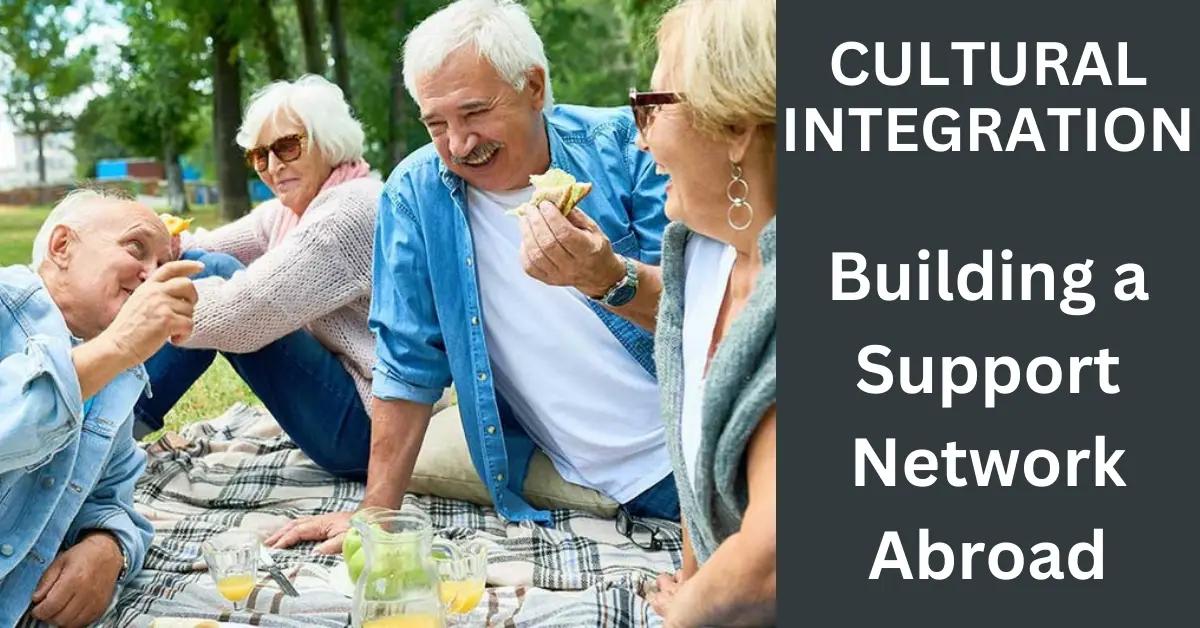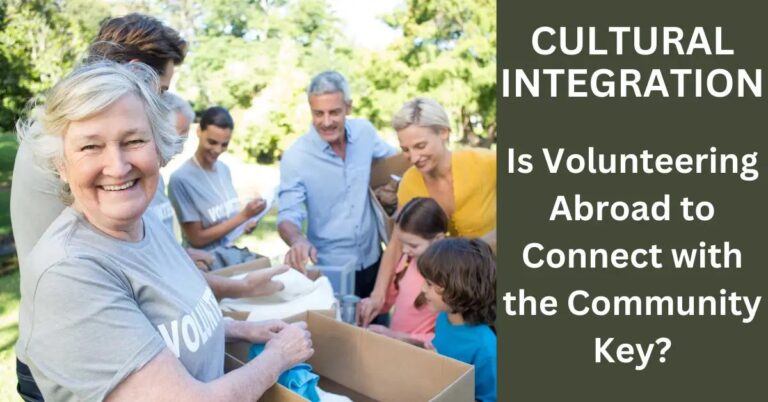TL;DR:
- Join local expat groups and associations to make friends and connections in a new country.
- Use online platforms like Internations for networking and support.
- Engage in local expat events and meetings to meet like-minded individuals.
- Build your network using LinkedIn and leverage social media for global connections.
- Integrate into communities by attending cultural events, language exchange programs, and volunteering.
- Be proactive in reaching out, understand cultural norms, and practice cultural empathy.
- Manage emotional challenges through professional counseling, support groups, and engaging in hobbies.
- Local hobby groups or clubs are great for forming connections while participating in activities you enjoy.
- Continual learning about local culture enriches your experience and fosters strong relationships.
Building a support network abroad can feel daunting. Yet, it's your lifeline. As an expat, connecting with others makes your new home feel welcoming. You need to join local expat groups, attend forums, and participate in events to meet fellow nomads. These connections ease the transition and enrich your life. Dive in to discover steps to create meaningful relationships abroad. Together, let's turn strangers into friends and acquaintances into community.
How Do I Set Up a Support Network in a New Country?
To build a support network, first know its importance. A support network gives you help and friends in your new home. It makes life easier and less lonely. So, how do you start this?
One way is to identify local expat groups and associations. Most cities with expats have these groups. They offer activities and information for newcomers. You can find these groups online or in local community centers.
Next, try expat forums and online communities. These forums are wonderful for asking questions and getting advice. They help you meet people before you even arrive! Websites like Internations offer great platforms for these interactions.
Joining and engaging with expat groups is a key step. Many of these groups hold regular meetings or events. These meetings are your chance to form friendships and connections. Attend as many gatherings as possible to meet people with similar journeys.
Finally, attend local expat events. Events like these happen often and bring together many like-minded people. You might find a book club, cooking class, or cultural trip. These are perfect settings to make connections while enjoying an activity.
Setting up a support network takes time and effort. You have to be open and willing to engage. Join activities that interest you and be present in your new community. Don’t fear reaching out; those you meet might be seeking the same connections you are aiming for.
How do I network with someone in another country?
Networking in another country starts with making yourself visible online. International networking platforms are key. LinkedIn can connect you to professionals worldwide. Create a strong profile and join groups related to your industry.
Next, consider attending networking events for expatriates. These events help you meet others in similar situations. They are often held in larger cities and can be found online. These events are not only for business. They also help in connecting on a personal level.
Leveraging social media is another powerful way to build your network. Platforms like Facebook and Instagram allow for global connections. Look for groups or pages specific to your interests or field. Engage with posts and start conversations. This will help you build meaningful connections.
A strategy I find useful for making professional connections abroad is to be proactive. Reach out to potential contacts. A polite message expressing interest in their work can make a big difference. Be clear about your goals and how you can bring value.
Effective cross-border communication comes down to understanding cultural differences. Learn about the customs and preferences in the country you're interested in. Each culture has its own norms for communication. Show respect and be open to learning new things.
Understanding these strategies can vastly improve your networking success. Expanding your network beyond borders is a worthy effort. It opens doors to new opportunities and enriches your life in many ways. Keep these tips in mind, and you'll find yourself making connections all over the globe.
How Can I Integrate into Local Communities Effectively?
Integrating into local communities can be exciting yet challenging. Start by asking yourself, "How can I integrate into local communities?" Answer: Join local cultural events and traditions. These are great opportunities to learn and mix with locals.
Next, consider language exchange programs. These programs help you learn the language and meet new friends. Speaking the local language can open doors you didn't even know were there!
Volunteering is another great way to meet locals and feel part of the community. Many communities need volunteers for various events or services. When you give your time, you show you care about the place you live in.
Building trust takes time. You should be patient and open with others. Sharing experiences and listening can help you learn and bond with community members. This trust leads to strong and lasting relationships.
Try to find local hobby groups or clubs. Whether it's a sports team, a book club, or a cooking class, joining groups that interest you can connect you with like-minded people. You get to do what you love and meet those who enjoy it too.
Remember, integrating isn't just about you. Building relationships with locals can enrich your life abroad. Each interaction is a step toward your new community. So explore, engage, and learn—a new home awaits you!
Building a Support Network Abroad: How Can You Start?
What does it mean to build a support network? It means finding people who help you feel at home. When living abroad, emotional support matters. Identifying emotional challenges is vital. You may feel homesick or anxious. It's normal to face these feelings.
Professional counseling or coaching can help. A counselor can give you tools to handle emotions. They listen and guide you through tough times.
Expat support groups bring people together who understand your feelings. These groups connect folks with shared experiences. It's comforting to talk with those who know your struggles. Therapy circles can also provide an open space to share.
Sharing experiences with fellow expatriates is beneficial. Exchange stories about your journeys. It allows you to gain new insights or reassurance you are not alone.
To conquer homesickness and anxiety, try several coping mechanisms. Keep pictures of loved ones nearby. Stay in touch with friends and family back home. Plan virtual hangouts. It might even feel like you're all in the same room!
Engage in new hobbies and discover local culture. It takes time, but finding joy in your new environment transforms your experience. Joining local activities can be another great outlet for socializing.
Remember, many have faced similar struggles, and they have found ways to thrive. Surround yourself with people who care, whether they are new friends or professionals. It's key to a happy life abroad.
Building a Support Network Abroad: How Can You Start?
When moving abroad, adapting to a new culture can feel overwhelming. To adjust, you need solid cultural adjustment strategies and a keen sense of cultural empathy. But how do you create an international network? Start by developing cross-cultural communication skills. This means listening more and watching the way people speak and act. Try to learn new phrases and words in the local language. Using the local language shows respect and helps you connect deeper with others.
Next, dive into local customs and cultural norms. These norms might include how to greet people or proper dining etiquette. For example, in some places, people prefer a firm handshake, while others like a gentle bow. Watch others, ask polite questions, and always be open to learning. This willingness to learn fosters better relationships and trust.
Practicing cultural empathy and sensitivity is crucial. Cultural empathy means putting yourself in another’s shoes. Understand their history and why they think and act the way they do. If you respect these cultural differences, you build stronger and more sincere connections. This empathetic approach is key in making friends in a new environment.
Engage in cultural exchange programs if available. Such programs can introduce you to local friends who share your interests. They open doors to friendships and meaningful exchanges, enriching your experience abroad.
Finally, use resources for continual cultural learning and adaptation. Find books, websites, or local classes about your new home. These resources can teach you more about cultural subtleties and offer tips for engaging more effectively. For example, joining clubs or community groups dedicated to cultural activities can offer fresh perspectives.
Embracing these strategies not only helps you adapt but also enriches your experience. These cultural strategies enable you to feel more at home and build lasting friendships in your new community.
Conclusion
Building a support network is key to thriving abroad. Connect with local expat groups and engage with global networks online. Attend networking events to meet new people and explore your host country. By integrating into the local community, you'll build meaningful relationships. Don't forget to seek emotional support when needed—join expat groups and share your experiences. These strategies ensure a smooth transition, enriching your journey. Dive in, connect, and grow!












